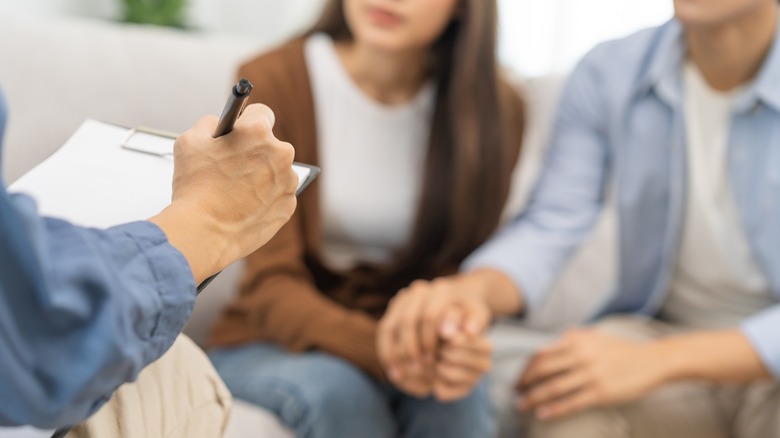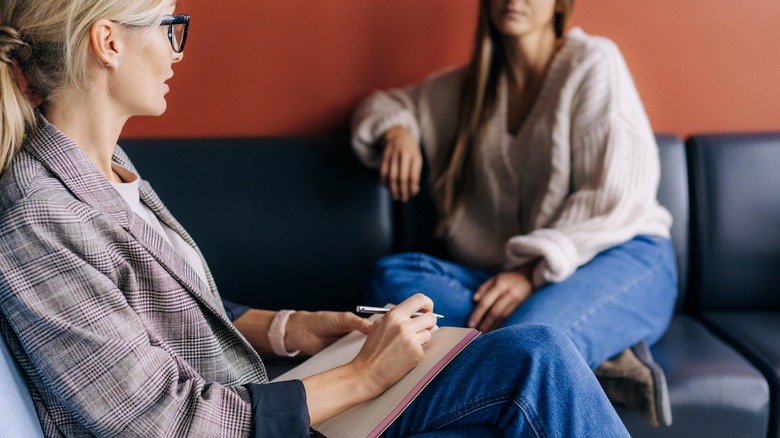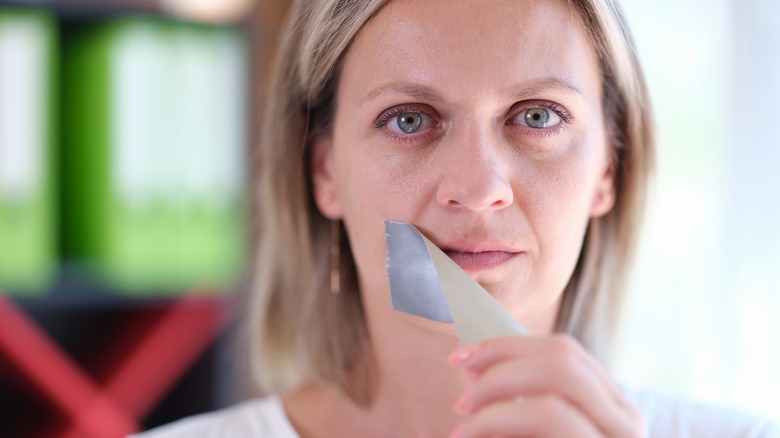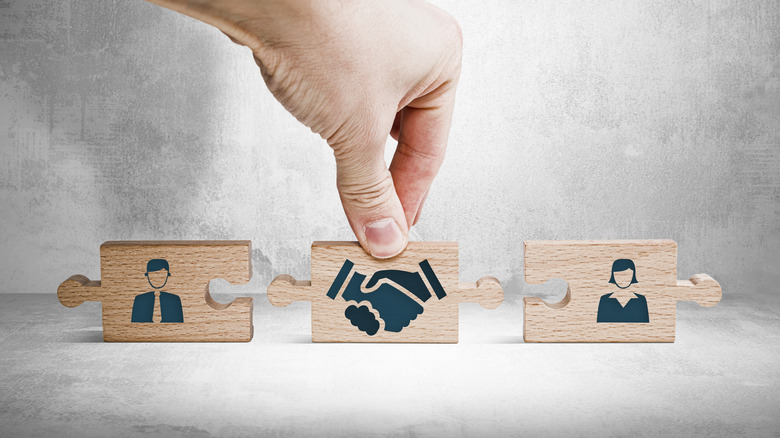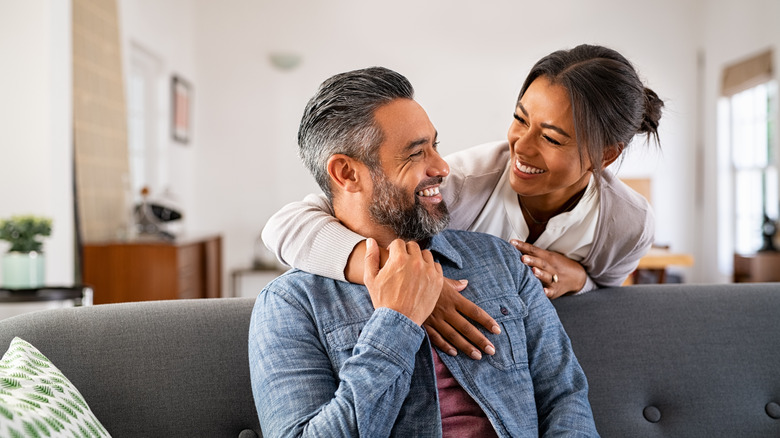Reasons To Try Couples Therapy Without Your Partner Present
Everyone feels differently about therapy. Even your partner, with whom you may have built a home and nurtured children, could have different views from you about sharing their feelings and thoughts in front of a licensed and impartial third party. Despite this, a study involving 1000 couples found that nearly 50% of participants have tried couples therapy at some point in their relationship, per Choosing Therapy.
Speaking to CNN, licensed therapist Kristie Overstreet shares that problems in a relationship often start as small strains that become bigger issues when left unaddressed, and this is where couples counseling can help. "The majority of couples that I work with say that they should have started therapy years earlier," she admits. The signs that you should see a couples therapist should probably not be ignored.
What if you do see the signs and want to seek outside help but realize, much to your dismay, that you're the only one who wants to do so? Los Angeles-based psychotherapist Darren Haber has seen this happen all too often, he writes for Psychology Today. One half of a partnership gets in touch, wanting to try therapy, and then the interest wanes because the other party doesn't see the point of it all. Can you still go? Haber thinks you can.
So, what can couples therapy do for you and your relationship if you choose to attend the sessions without your partner present?
You can learn communication skills that will become useful when you address your partner
While a marriage therapist can tackle the more serious issues of how to safeguard your relationship from infidelity, they can also focus on the more everyday issues like learning proper communication methods.
Mental health counselor Traci Ruble thinks that seeing a couples therapist by yourself can help you learn the right communication skills to express how you feel in front of your partner eventually (via Good Therapy). Are there topics or sensitive issues you feel uncomfortable or fearful of bringing up with your partner in the same room? Perhaps you feel judged or embarrassed to talk about them. In situations like these, going to couples therapy alone can prove beneficial for you and your partner.
Speaking to HuffPost, psychologist Kristin Zeising explains that there are also instances where you might be worried about hurting your partner's feelings by the way you share your thoughts, especially if you're someone who's blunt or more logical than emotional. "A therapist can give you honest feedback and help you find the most effective and authentic way to communicate your feelings and concerns to your partner," she adds.
You can give your therapist an uncensored version of things
You can be frank, direct, and uncensored with your therapist if you decide to attend the sessions without your spouse present.
It is not uncommon for partners to feel relationship anxiety from time to time, largely because we're our own worst critics and often develop the habit of pointing out and magnifying our own flaws, per Psych Alive. Because of this, it can be difficult to show your true self to your partner.
Melbourne-based couples therapist Debra Campbell tells HuffPost that seeing a couples therapist alone is also beneficial for practitioners in the field. "Seeing a partner privately gives the therapist a chance to better understand where the person is struggling most in the relationship, without them censoring themselves to protect the other," she explains. The therapist becomes better equipped to guide the partner who's chosen to come to sessions by themselves in areas of conflict management.
The change can start with one person
Psychotherapist Darren Haber believes that the person who expresses interest in a couple's therapy is one half of the relationship (via Psychology Today). Contrary to what you are led to believe, you don't live and operate as separate entities. Your actions and behaviors affect others and the environment around you. Arkansas-based marriage counselor Becky Whetstone tells HuffPost it's useful to visualize a "well-oiled machine" when describing how a family unit works. Everyone is interconnected to a larger whole and sometimes, there are defective parts in the machine. When that happens, the issues need to be addressed so that they can be fixed and the machine as a whole can begin to work optimally again.
Columbus, Ohio-based relationship therapist David Bowers agrees with this line of thinking, telling Healthline, "One of the really cool things about a system such as a relationship is that if one part of the system changes, the whole system changes."
You might learn about how a healthy relationship works
Counselors are trained to help you learn respectful and practical ways in which to approach problems, according to The School of Life. When we learn new ways to communicate and resolve conflict, we can draw from these tools during our next disagreement with our partner.
Does your partner talk to you in a disrespectful manner? Do you belittle them in front of friends and family? Do you not divide your chores in a fair way between the two of you? Whetstone says that learning about how a healthy relationship works can help you set boundaries with your partner too (via HuffPost). "At home, this may mean that you no longer put up with things you used to or start doing things you wouldn't have agreed to do before," she adds.
If you're in the habit of diagnosing your partner, going to couples therapy by yourself might help you avoid doing that, reports Couple's Counseling. Psychologist Howard Markman thinks that when one half of a couple finds a reason to try therapy, couple's therapy is a better choice than individual therapy because the relational model of counseling imparts "practical skills for improving the relationship" whereas the individual approach focuses on things we learned in our childhood (via The Wall Street Journal).
You can avoid the risk of waiting too long
Not being on the same page about getting help from therapy is one of the reasons why relationships struggle, per Love Recon, and sometimes your connection can be on the verge of crumbling by the time therapy becomes an option. By choosing to go it alone when your partner is on the fence or even unwilling to attend sessions, you are giving yourself an early shot at saving your relationship.
If your partner doesn't see why your relationship could benefit from couples therapy, it doesn't mean you have to think or feel the same way and give up trying.
While attempting to fix a marriage by yourself is not the best route to take, there are benefits to it as well. If you work on your own anger issues, accept responsibility, and take initiative to mend things, your relationship might just have a chance.
You can gain peace of mind and happiness for yourself
While 48-year-old Colleen Orme and her husband Tom (49) started couples therapy together, Tom quit after a while (via The Wall Street Journal). However, Colleen found reasons to continue on her own. "We spend a lot of time in marriages trying to fix the other person. I changed my approach and decided to focus on how I can become happy," she shared. By going to therapy alone, she learned to make herself happy without putting that job on her husband.
Even if there isn't a happy ending as a result of couples therapy, you will have the peace of mind of knowing that you gave it your best shot, according to Whetstone. "Whether the relationship survives or not, the person who went to therapy alone will know they did all they could to improve and save the marriage," she notes.
If you're still apprehensive about approaching couples therapy without your spouse present, why not try a therapist who fits your needs online? It might be a good segway into meeting a professional in person.
